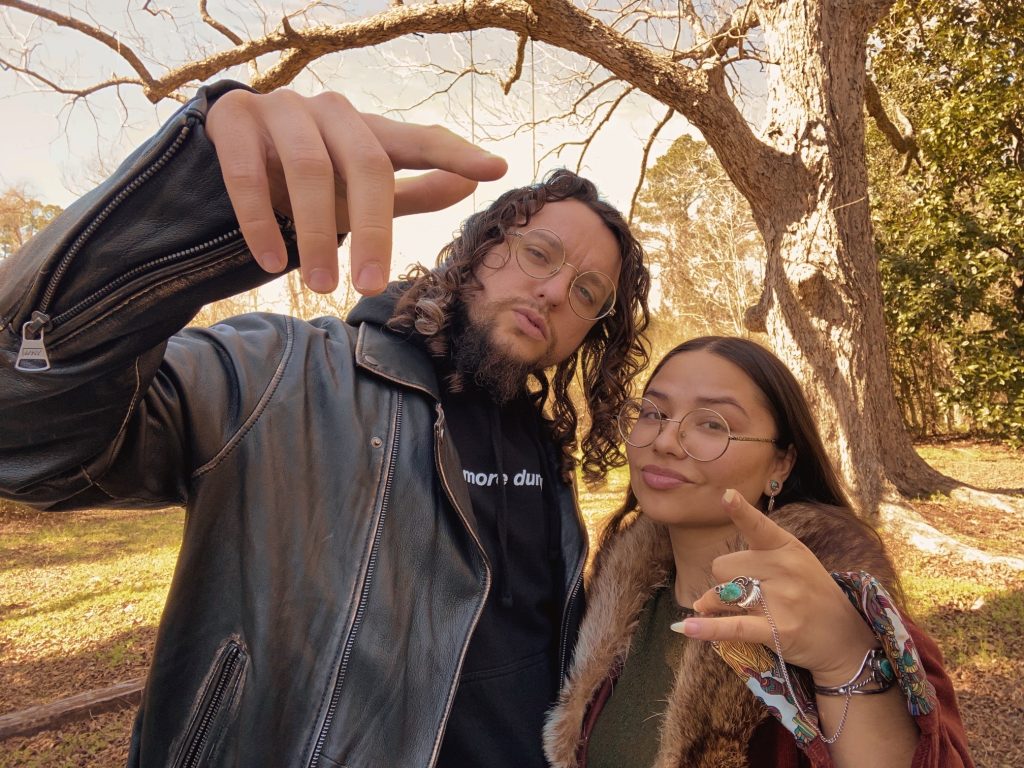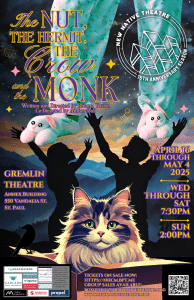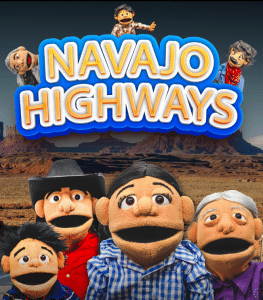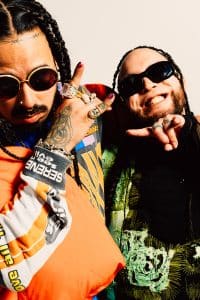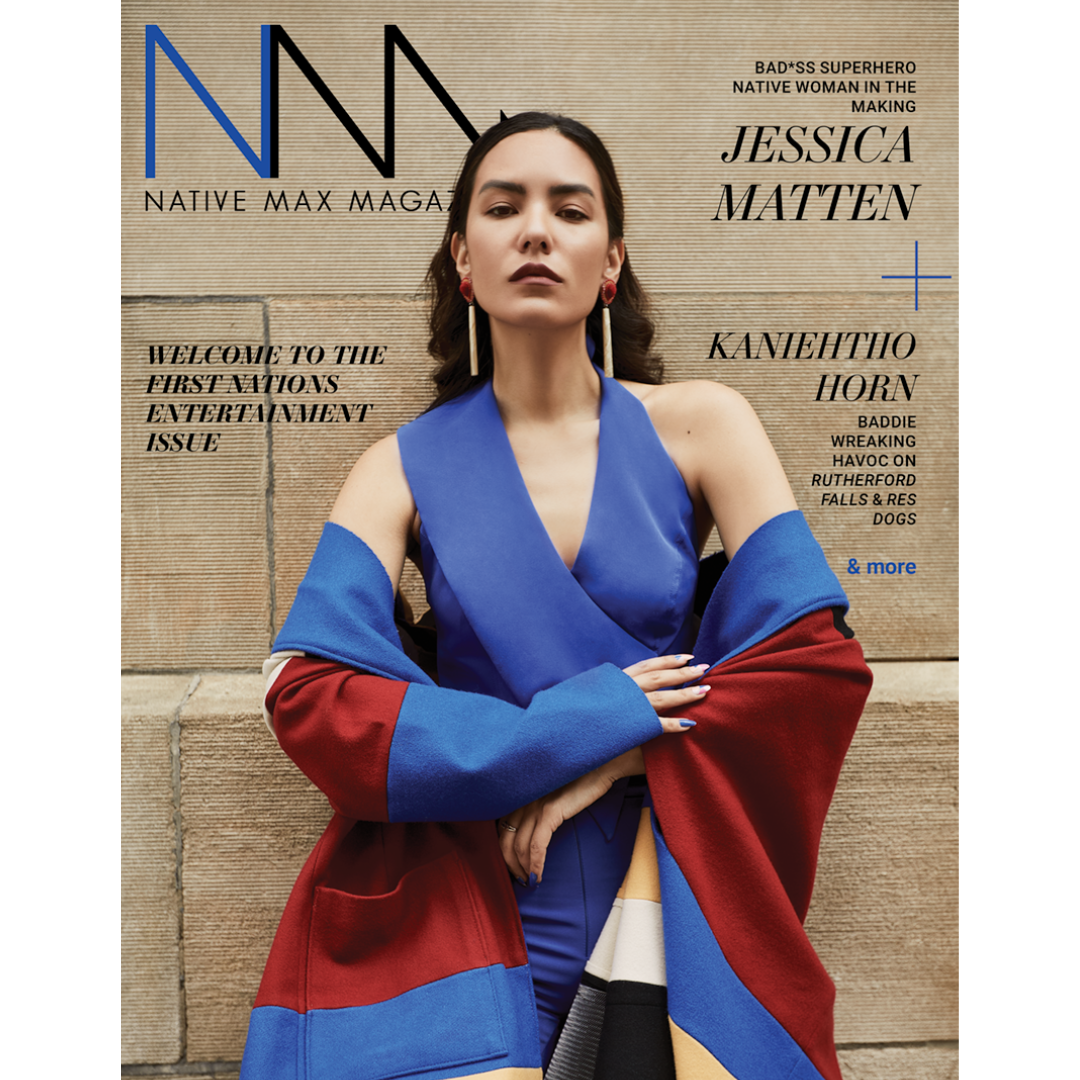Ask a random person on the street to name an Indigenous musician, and it’d be a wonder if they’d come up with anyone other than Redbone (I mean, who doesn’t love Redbone?). As in many other industries, Indigenous music has had a severe lack of representation in mainstream media, making an already competitive field even more so for Native artists.
With the advent of social media, however, self-promotion is becoming far more effective, allowing for creative types to carve their own paths. Now, Indigenous musicians are able to reach a wider audience and make a name for themselves in their respective genres, examples being artists such as Darksiderz and Shawnee. Relatively new to the field is hip-hop/rap duo T H R O N E, made up of YVHIKV (Mvskoke) and Hayatheus. Originally meeting in a recording studio nearly three years ago, they’ve worked together since and released their debut album “Lionfish” in late February this year.
With soulful lyrics and music that blends genres, T H R O N E establishes itself as a unique and talented duo that is quickly capturing people’s attention. We spoke to YVHIKV and Hayatheus about the process of releasing “Lionfish” and how the former’s Indigenous heritage influences their work.
Could you share a bit about yourselves with our readers?
Yes! We are a vocalist duo and a duo in real life! My name is YVHIKV (yuh-hey-guh) and his name is Hayatheus (hi-ah-theus), or H, but people just call him H. To keep it simple, I’m from Dewar, Oklahoma, and H grew up with his family in Charlotte, North Carolina, and Connecticut/NYC area. We are both of mixed descent, my dad is Mvskoke (Creek) and my mother is Mexican, Irish, and possibly Navajo. We don’t have all the facts yet. But H’s dad is Jewish from NYC and his mom is European from Germany.
When did you first get into music? What were some of your earliest inspirations?
Well, my music interest really kicked off in high school. I started out writing songs and messing with my dad’s recording equipment, but my jazz band instructor started giving me vocal pieces after he heard me sing in the empty gymnasium one day before class. So, I had been inspired by my dad’s music career and his inspirations in hip-hop like Jurassic 5, KRS-One, DITC, and Slick Rick, but plenty of rock, soul, RnB, artists like Radiohead, Jill Scott, Lenny Kravits, Erykah Badu and especially Amy Winehouse. But I also became inspired by the music I was playing and singing in my school’s jazz band.
For H, he was pursuing a business career when he got into a car crash in Dubai. Doctors told him he wouldn’t be able to walk for more than a few minutes if he was lucky. After going through months of physical therapy and managing to heal almost completely, he realized he needed to reset his whole life to become an artist and make music. He’s heavily inspired by rappers like MF DOOM, Earl Sweatshirt, Mach-Hommy, Your Old Droog, MAVI, MIKE, Redveil, Armand Hammer, Griselda, Pink Siifu, and lots of others but also producers like Knxwledge, Madlib, the Alchemist, and Ahwlee. We also both grew up loving the Jacksons and Gorillaz. Plus we still do!

What were some of the challenges in producing your first album?
Ooof! We had many challenges, but the main one was consolidating and communicating artistic ideas within our team during the mixing process. KingJP, the producer, is from Montreal, our mixing engineer is from Portugal, and our mastering engineer is from California, so collaborating digitally was fine, but there’s not a constant flow of communication when we pass a beat with stems, vocal stems, and ideas around. Also, adding the media samples and transitions took us some time because we wanted everything to feel right. And that’s super subjective! So, needless to say, we all like working with artists, but we are all, still, very much artists. H probably has the most experience organizing artists and ideas from his old career, but he’s also really good at it! He always makes sure everyone says what they want and gets the credit they deserve.
Not many Indigenous musicians are recognized in mainstream pop culture, why do you think that is? Do you see a change in that at all?
Well… for a long time, I think Indigenous people’s stories were too historic and guilt-ridden to be told in an attractive way for pop culture. I think even within our own communities, these stories can hurt us. Even my tribe is relatively small, and when people can’t relate, it can feel really lonely. But today, you see relations building because of the characteristics of media or social media and their emphasis on things we all connect with. Those relations are healing, not just for us. So, as long as we keep connecting our Indigenous culture and human experiences, I imagine we’ll see more shows like Reservation Dogs, more characters and stories like those in Boba Fett, and more artists like us in the future.
The first song in your album, “Lionfish”, is in your Indigenous language, how did you go about writing that?
I was inspired by the song “Weird Fishes” by Radiohead to write a short poem. It goes, “I was in love with a sad song. It was strong, but ended when we realized it was out of fear of coming out the dark.” So the song is part this poem and part it’s inspiration. It’s really a song for my feelings on the status of my tribe’s language. My grandmother grew up speaking Mvskoke, so the way she spoke was conversational and full of slang, but she and her mother lived during a time when people felt it was better for their children to speak English. So my grandmother’s tongue, like the two elder women who helped me translate this song, is not the “technical” tongue that’s taught to youth in language programs who want to learn it. My father knows the language through her, and I learned through them. The life cycle of our language is intense and scary for some, and I know someday it will pass, like everything that lives. That’s what I feel when I hear “Weird Fishes.” Maybe someday Thom Yorke will notice he has an Indigenous version of his song!
What sort of messages do you hope to impart to your listeners with your music?
We hope to be part of the healing I talked about earlier. We want people to feel good about their lives and know they are not alone. We always joke and imagine our listeners to be the most understanding and empathetic, but also the most fearless and braggadocious people at the same time because as humans, we should allow that kind of complexity and playfulness in our lives.
Where can our readers follow your work?
Follow us on Tik Tok or Instagram @somerapcouple or follow us wherever you stream music! But when you search for us “T H R O N E” you gotta put those spaces between the letters! [Laughs]

